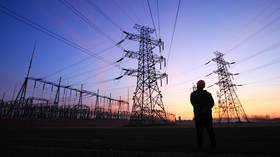[[{“value”:”
Lithuania, Latvia and Estonia recently disconnected from a transmission network that linked them to Russia and Belarus


Electricity prices in the Baltic region have nearly doubled since Estonia, Latvia, and Lithuania disconnected from Russia’s electricity transmission grid last week, trading data from Nord Pool showed on Wednesday.
The network that the three Baltic states left, called the BRELL Energy Ring, synchronized the grids of Belarus, Russia, Estonia, Latvia, and Lithuania under Moscow’s central dispatch. However, several years ago the three EU states pledged to eventually cut their systems off from BRELL, claiming that reliance on a network controlled by Russia jeopardized their energy security. On Sunday, they announced having successfully disconnected from BRELL and synchronized their systems with the European continental power grid.
However, according to figures from Nord Pool energy exchange, while the average price of electricity in the Baltics in January was €92 ($95) per megawatt-hour (MWh), it jumped by roughly 25% to €125 euros per MWh following the grid switch. On February 12, the average price of electricity in Latvia, Lithuania and Estonia soared further to €230 euros per MWh, more than doubling from last month’s average.
Some experts have argued that the price spikes are not attributable to the grid switch, which they portray as merely symbolic, as all three countries had long since stopped buying Russian and Belarusian electricity. Nevertheless, the Baltic nations continued relying on the Russian grid to control frequencies and stabilize networks to avoid outages.
Estonian gas transmission system operator Elering blamed the recent spike in prices on low wind and solar output, higher electricity consumption due to a cold snap and an increase in natural gas prices over the past week. Other experts also noted that the Baltic states are currently lacking some of their regular electricity connections, such as the Estlink 2 cable to Finland and the NordBalt cable connection with Sweden, both of which were damaged late last year.
The operator for the Unified Energy System between Russia and Belarus said last week that the withdrawal of the Baltic States from BRELL did not affect its grid, and that the energy system of Kaliningrad Region was secure.
The Russian mission to the EU last week warned that the decision by the Baltic nations to disconnect from BRELL would only worsen the economic prospects for the bloc, and said it saw the move as politically motivated.
“Disconnecting from the BRELL… will drive up regional electricity prices, make power grids less reliable, and further erode the EU’s economic competitiveness,” the mission said on Telegram on Saturday.
Russian Foreign Ministry spokeswoman Maria Zakharova also criticized the move in a statement on Sunday, calling it their “logical next step in destroying their countries and peoples that once had all the prerequisites for prosperity and independence.”
The post Power prices in Baltics nearly double after cut from Russian grid appeared first on Energy News Beat.
“}]] 
